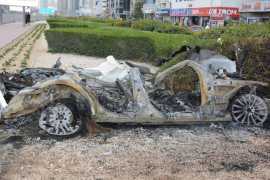Butane abuse reaching worrying levels among UAE’s teens, experts say

The National -- Butane abuse is reaching worrying levels among teenagers in the UAE, addiction experts said just days after two boys were severely burned when the compressed gas they were inhaling caught fire.
Police said the boys, aged 14 and 16, were inhaling the gas while sitting in a parked car in Sharjah with the windows closed when the compressed gas caught fire and caused an explosion.
Inhaling butane gas is a criminal offence in the UAE. Statistics from the Ministry of Interior showed that sixty people were arrested for abusing lighter fluid over the past three years.
Despite government initiatives to deter teenagers from its use, the wide availability and relative cheapness of butane makes it easily accessible to young people.
“The problem is that butane is cheap and easily available,” said Sami Hassan, director of media relations at Erada Centre for Treatment and Rehab.
“Using inhalants such as butane gas is not a new phenomenon in the UAE.
“Some people started getting addicted on butane gas dozens of years ago but we have seen a resurgence in its use in recent years,” he said.
“My experience of 20 years in the anti-narcotics field, those who got involved in any type of addiction have paid dearly,” said Col Saeed Al Suwaidi, director-general of the Anti-Narcotics Federal Directorate and general deputy Chairman of the Anti-Narcotics Council.
Dubai Police have previously suggested the sale of aerosol cans and lighter fluid should be regulated.
But Mr Hassan said imposing restrictions would do little to curb butane abuse in the country.
“All supermarkets are selling this substance. Imposing restrictions on selling butane gas might create other problems, such as illegal lighter gas trade. For instance, some individuals will start selling butane gas bottles higher than its actual price,” Mr Hassan said.
He suggested education instead to teach children of the dangers of solvent abuse and curb what he described as a worrying and highly risky trend.
“Education is key to addressing all addiction issues, including getting addicted on butane gas.
“Increasing awareness among children and teenagers about the consequences of inhaling lighter fluid is essential.
“Some of the ways to address this problem is to do more health education programmes in schools about the dangers of inhaling such substances,” said Mr Hassan.
Inhaling butane gas can cause momentary euphoria but its repeated use can cause loss of consciousness, hallucination, narcosis, asphyxia and cardiac arrhythmia.
Prolonged abuse can cause long-term health implications such as kidney and liver damage, brain damage, seizures and even instant death.
“I have seen an individual suffering from butane gas addiction. He lost a lot weight, suffered from hallucinations and shivering,” said Mr Hassan of a 19-year-old man who was treated at the at Erada centre.
“I dealt with an Emirati man who was suffering from this type of addiction. I remember seeing him laughing by himself.”
Mr Hassan said the onus was also on parents to keep an eye on their children and intervene swiftly if they suspected any abuse.
Dr Saliha Afridi, a clinical psychologist and the managing director of The LightHouse Arabia, said addiction to butane gas is as severe as that to any other drug.
“Teenagers consume it to get intoxicated and become high,” she said.
“Unlike cigarettes and alcohol, teens have an access to butane gas and can buy it easily.
“Adolescents will seek new adventures because the dopamine, pleasure chemical, release in an adolescent’s brain is far more than in an adult’s brain.”.
Dr Afridi said peer pressure is among the reasons that drive a teenager to try the inhalant.
“They are in a stage in their lives where they are more likely to disconnect from their parents, and connect to a social group.
“If some individuals in their social group consume butane gas, there is an increased risk of them trying it.”























